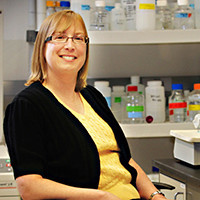
University of Utah Professor Shelley Minteer is converting microbes into fuel cells and her research into an international award.
The professor of chemistry and materials science and engineering will receive the Luigi Galvani Prize of the Bioelectrochemistry Society, an honor given once every two years for research in the field of bioelectrochemistry. Minteer, who will accept the prize in June during the society’s symposium in Malmo, Sweden, is the first professor from the U to receive the award.
“I was definitely happy to get the email this morning,” she said. “It gives you a feeling of validation for your research efforts that you don’t get from just publishing papers.”
Minteer and her team, which includes seven postdoctoral fellows, eight graduate students, and six undergraduate students, are being honored for their research in developing bio-batteries, specifically, using metabolic pathways to convert chemical energy into electricity. The batteries could be used for portable devices from musical greeting cards to television remote controls, just about any device that uses AA or AAA batteries.
The benefit of using bio-batteries over traditional batteries, which are made with toxic chemicals and metals, is that they are biodegradable and therefore better for the environment. Unlike metal-based batteries, they are safer and will not produce chemical burns or explosions. The technology also is cheaper because it doesn’t require manufacturers to mine metals as they do with typical batteries – they simply just grow more microbes in a lab.
“What is nice about biofuels is they are really high in energy density and therefore can produce longer lasting battery technology,” said Minteer, who also is a Utah Science Technology and Research (USTAR) professor.
Currently, Minteer and her team are making prototypes and working with companies to commercialize the research. She believes that the first products can emerge in about five years.
The Bioelectrochemical Society is a non-profit scientific association of scientists researching the application of electrochemical concepts and techniques to the study of living systems.